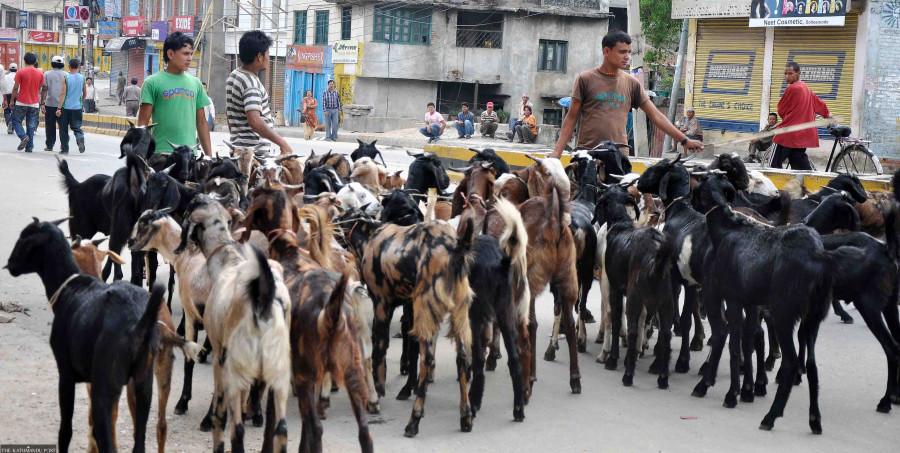Money
Dashain goat sales to stay at last year’s level
Livestock traders say they expect to sell 50,000 animals in Kathmandu Valley this festival season.
Krishana Prasain
One sign that Dashain is in the air is the arrival of herds of bleating goats in the city. Buying a buck for sacrifice and feasting is one of the excitements of the festival for many Nepalis, but traders say sales this year are likely to be subdued like before as people have less money to spend.
Several livestock traders the Post spoke to said festival sales in Kathmandu Valley may reach around 50,000 animals, the same like last year. Before the Covid pandemic wrecked the economy, Dashain celebrators used to buy 80,000 goats.
“We expect goat demand to remain the same as during the last Dashain. This year, an economic slowdown and high inflation have eroded customers’ purchasing capacity,” said Gobinda Prasad Subedi, central president of the Nepal Commercial Goat Producers Federation.
“We are not expecting an increase in goat demand,” he said.
From next week, people will begin searching for their favourite goats in the market, depending on their budget. Animal sacrifices and feasting are the highlights of the festival. Ghatasthapana, the first day of the two-week-long festival falls on October 15 this year.
Goat prices had declined last year too. “Some traders were forced to return their unsold animals,” said Subedi. “This year, we are planning to supply goats depending on demand.”
Traders say domestic production will be sufficient to meet the requirement this year, and there will be no need to import goats. They said prices would be like last year. Live goats cost Rs600 to Rs700 per kg.
The Department of Livestock Service said it had been holding discussions about the market situation with suppliers, transporters, traders, consumers and Food Management and Trading Company.
“Goats will be supplied according to demand. Last year, around 51,000 goats were sold in one week. We are expecting the same level of sales this year,” said Chandra Dhakal, senior livestock development officer at the Department of Livestock Service.
Around 30,000 goats will be delivered at Kalanki Khasi Bazaar and another 20,000 will be delivered at different collection centres in the valley. As usual, the government agency has a fixed sales quota.
Sharmila Neupane Subedi, information officer at Food Management and Trading Company, said they plan to bring 2,000 goats and 1,000 mountain goats for Dashain.
"Goats will be supplied from Tulsipur and Hetauda while mountain goats will be brought from Rasuwa," she said. “We expect the goats to start arriving from Friday.”
The company will open sales from Ghatasthapana.
Private traders bring goats from Sindhuli, Ramechhap, Okhaldhunga, Bhojpur, Khotang, Hetauda, Bara, Parsa, Rautahat, Sarlahi, Kabhre and Makwanpur.
Dhakal said that goat production had increased in the Tarai districts of Morang, Bara, Tulsipur, Sunsari, Sarlahi, Rupandehi, Kapilvastu, Banke, Dang and Bardiya.
He said that nearly a dozen points had been identified in Kathmandu Valley to sell goats. “The health of the animals will be examined at all collection centres.”
Goat sales normally increase sharply during the four days before Phulpati.
According to the department, there are 10.82 million goats across the country, and 5 million goats are sold in the market annually.
The department said that around 500,000 goats are consumed in Kathmandu Valley annually.
“We provide import approval if the importers fulfil all the paper work,” said Dhakal. "Goats are not being imported legally this year."
According to Subedi, Food Management and Trading Company sold 1,615 goats and mountain goats last year. Live goats weighing 20-25 kg were sold at Rs560 per kg while goats weighing above 25 kg were sold at Rs570 per kg.
“There are fewer chances of goat prices increasing this Dashain. The price will be fixed on the basis of purchase price, transportation cost, other expenses and market rate,” said Subedi.
“We cannot say what the price will be until we buy the goats,” she said. "Also, the price is fixed by the primary purchase committee which is chaired by the chief district officer and includes farmers."
According to traders, live goats are currently being sold for Rs600 to Rs700 per kg.
Analysts say opportunist traders may try to take advantage of the festive fervour.
“If there is any hike in meat prices, we will inspect the market. We will also inspect the goat market once the supply starts,” said Ananda Raj Pokharel, information officer at the Department of Commerce Supplies and Consumer Protection.
"Goats are smuggled into the country across the southern border during Dashain, which hampers sales of domestic goats and hurts farmers," said traders.
“Goat production is sufficient in different parts of the country, but supply could be disrupted if there is no proper provision of transportation,” said Subedi.




 9.7°C Kathmandu
9.7°C Kathmandu















